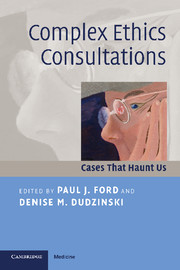Book contents
- Frontmatter
- Contents
- List of contributors
- Foreword
- Acknowledgments
- Introduction: Live and learn: courage, honesty, and vulnerability
- Part I Starting at the beginning: prenatal and neonatal issues
- Part II The most vulnerable of us: pediatrics
- Part III Diversity of desires and limits of liberty: psychiatric and psychological issues
- Part IV Withholding therapy with a twist
- Part V The unspeakable/unassailable: religious and cultural beliefs
- 17 Adolescent pregnancy, confidentiality, and culture
- 18 “Tanya, the one with Jonathan's kidney”: a living unrelated donor case of church associates
- 19 Futility, Islam, and death
- 20 Suffering as God's will
- Part VI Human guinea pigs and miracles: clinical innovations and unorthodox treatment
- Part VII The big picture: organizational issues
- Conclusions, educational activities, and references
- Index
20 - Suffering as God's will
Published online by Cambridge University Press: 03 May 2010
- Frontmatter
- Contents
- List of contributors
- Foreword
- Acknowledgments
- Introduction: Live and learn: courage, honesty, and vulnerability
- Part I Starting at the beginning: prenatal and neonatal issues
- Part II The most vulnerable of us: pediatrics
- Part III Diversity of desires and limits of liberty: psychiatric and psychological issues
- Part IV Withholding therapy with a twist
- Part V The unspeakable/unassailable: religious and cultural beliefs
- 17 Adolescent pregnancy, confidentiality, and culture
- 18 “Tanya, the one with Jonathan's kidney”: a living unrelated donor case of church associates
- 19 Futility, Islam, and death
- 20 Suffering as God's will
- Part VI Human guinea pigs and miracles: clinical innovations and unorthodox treatment
- Part VII The big picture: organizational issues
- Conclusions, educational activities, and references
- Index
Summary
Case narrative
The clinical ethics consultation service received a telephone call from Dr. Cedar, an attending hospitalist. He briefly explained that Mr. Carnegie, a 70-year-old man, was refusing surgery for what Dr. Cedar described as a life-threatening bowel obstruction. The patient had been hospitalized repeatedly over the last 10 years for his underlying end-stage chronic obstructive pulmonary disease (COPD) with accompanying hypertension. He had periodically needed mechanical ventilation in the past and would likely need it again as his COPD worsened. According to Dr. Cedar, Mr. Carnegie had three viable treatment options: (a) undergo a relatively high-risk surgery to resolve the obstruction, (b) be discharged with total parenteral nutrition (TPN), suctioning, and a do-not-resuscitate (DNR) order, and (c) be discharged with palliative medicine/hospice care, a DNR order, and no means for feeding and hydration.
The patient was refusing surgery, refusing TPN, and refusing to have a DNR order written. He also refused to talk with the palliative medicine group. Dr. Cedar believed the patient was globally competent, but there were inconsistencies in the patient's decision making that called into question his capacity related to treatment options. Dr. Cedar noted that the patient had no more than a high school level of education. Dr. Cedar requested that the ethics consultants meet with him and the patient. He indicated that a decision needed to be made because “good medicine requires a consistent care plan.” We went to the unit to meet face to face with the physician and patient.
In this case, the “we” of the ethics consultation service consists of a full-time clinical ethicist (PF) and a visiting bioethics doctoral candidate from Europe (KO).
- Type
- Chapter
- Information
- Complex Ethics ConsultationsCases that Haunt Us, pp. 155 - 162Publisher: Cambridge University PressPrint publication year: 2008



